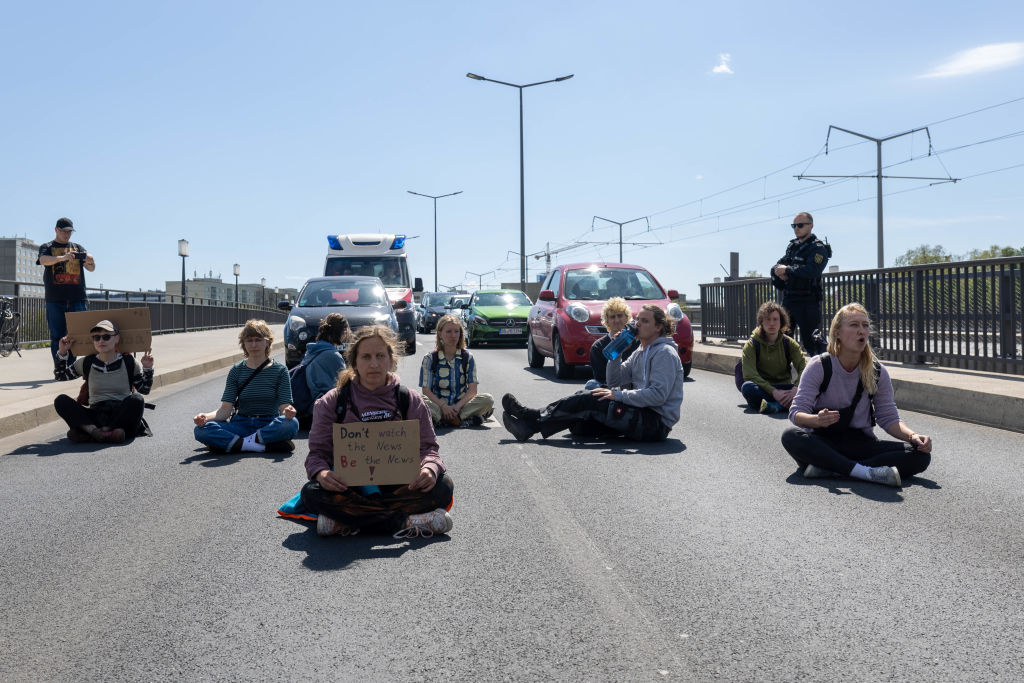E.U. energy mandates impose needless suffering in the name of elite fantasy.
The Green Road to Tyranny

Climate-change obsessives insist that we must roll back living standards in order to save the planet.
In all the hysteria about the threat to democracy connected to the bombast of Donald Trump, an arguably greater long-term threat is mounting, though all but ignored, from the well-funded green movement. Increasingly, as Jonathan Blake and Nils Gilman write in their new book, Children of a Modest Star, the much ballyhooed threat of climate change means that power needs to be stripped from nation-states and transferred to “planetary governance” informed by “planetary sapience,” which would then decree how humans use and generate energy.
Such proposals reflect not just extremism as exemplified by the leftist green parties but have support in the corporate establishment in both Europe and North America. Post-national governance has been an intrinsic aspect of corporate liberalism since at least the Club of Rome report, issued in 1972, financed by Italy’s oligarchic Agnelli family. That report pioneered the agenda of central control, austerity, and retrenchment necessary to stave off what was seen as inevitable population-driven mass starvation and social chaos.
Over the past 45 years—despite evidence to the contrary—this approach has grown in influence. Projections of massive shortages of natural resources, disasters and the food shortages continue to be widely accepted uncritically in media, academic, and political circles. All this despite the fact that energy and food are more plentiful than ever and the world has experienced the largest growth in affluence in its history.
The problem facing western Greens
The drive against local control and the nation-state comes naturally to the climate debate. The issue is global by nature, transcending national borders. The centralizing impetus comes at a time when the nation state, at least in the U.S. and Europe, is losing its hold on young people, as well as elites. This creates an opening for Blake and Gilman to suggest that only “planetary institutions,” run by credentialed experts, can address this issue.
Despite such lofty suggestions, western Greens still have a problem. It’s called people. Many middle and working class people in the West do not favor an agenda that means living in smaller dwelling units, enjoying less mobility, more costly home heating, less air-conditioning, and a more austere diet. Robert Jackson, Stanford’s Earth System Science professor, says that Americans should learn to like living on one-quarter of their current energy, essentially turning the clock back to consumption patterns of the fifties.
This pressure is all the more unpalatable because, while high income countries have been reducing their emissions, GHG growth is almost entirely tied to developing countries. China now emits more GHG than Japan, the EU, and North America put together. What the West does is less and less relevant. It is unlikely that developing countries such as Pakistan, India, Bangladesh and will stop their expanding use of fossil fuels, notably coal. China’s Xi Jinping suggests climate goals “can’t be detached from reality… We can’t toss away what’s feeding us now while what will feed us next is not in our pocket. “
The radicalization of the climate agenda
Given the clear reluctance of rising non-Western powers to embrace fully “the energy transition,” western climatistas seek to impose draconian conditions on people in high income countries. This includes EV mandates and the banning of new natural gas facilities while refusing to countenance nuclear power as a “clean” alternative to inefficient “renewable” energy. In most countries, the Greens have morphed into allies of the progressive Left, most recently on the Israel-Hamas war. Hysterics like Greta Thunberg and the destructive antics of enviro-activists epitomize this radicalization and the rise of cultural nihilism.
Rather than sober discussion about a very complex topic, the climate lobby offers endless talk of catastrophic results, including mass starvation, and a rapid growth in weather-related fatalities. Decades of predictions of impending, unalterable doom have proved more theatrical than accurate. “Climate science,” notes 2022 Nobel Prize laureate for Physics, John F. Clauser, “has metastasized into massive shock-journalistic pseudo-science.”
Yet the mainstream media continues to serve as the climate lobby’s useful idiots. This can be seen in the relentless media campaigns such as the New York Times piece last year suggesting “mass climate migration” away from places like Texas despite continued migration flows in the opposite direction. They can even buy media. The Rockefellers, heirs to the Standard Oil fortune, and other ultra-wealthy Greens are currently funding pliable climate reporters at organs like the Associated Press and National Public Radio.
This campaign has succeeded in radicalizing left-leaning professionals and also helped set the majority of young people in the world in a state of “climate anxiety.” The constant attempts, often poorly founded, to blame every disaster from fires and hurricanes as well as heat waves and droughts on climate change lead to a permanent state of hysteria.
The revolt of the masses
The consequences to families or nations from the mad dash to achieve “net zero” emissions are largely ignored by the climatistas and their media acolytes. In this modern day class war it’s humanity itself that is openly disdained. Zealots like former National Park Service biologist David M. Graber deemed humans “a plague upon ourselves.”
Not surprisingly, this approach is not winning friends or making many converts. A recent Gallup poll shows that just three percent of the population considers climate change and the environment their main concern. Even young people, the group most concerned with climate change, rank it far below such things as inflation, inflation, housing, gun violence, jobs, and corruption.
To be sure, most Americans support the notion of climate mitigation but seem less than willing to pay a high price for it; a large majority seems unwilling even to pay $10 a month to “save” the planet. In contrast, a recent poll suggested that urban elites—high earners with graduate degrees—favor unpopular notions like rationing gas and meat
In the past, attempts to reduce air and water pollution won widespread support. But the new climate agenda offers few tangible gains other than a one-way ticket to downward mobility. In Europe, whose unelected transnational governing bodies have taken pride in embracing climate fundamentalism, there is now growing opposition to Green policies—strikingly demonstrated in this week’s EU elections—as the populace confronts the reality of closed industries, particularly the once mighty German industrial machine.
But it’s not just Germans; EU climate policies are also unsettling establishment parties in France, the Netherlands, Poland, Sweden, and Italy. Largely it’s a conflict between those who rely on affordable energy—factory workers, farmers, people involved in logistics—and the climate-obsessed in newsrooms, the universities, non-profits, and among the corporate elite. Even in ultra-hip Berlin, a referendum on tighter-emissions targets last year failed to win over enough voters.
Similar pushback is likely in America. The well-funded green lobbies—Robert Bryce has calculated they outspend fossil fuel and nuclear lobbies by four to one—may push a draconian agenda, but many Americans remain tied to GHG-producing industries like oil and gas. Overall, according to a Chamber of Commerce report, a full national ban on fracking, widely supported by Greens, would cost 14 million jobs —far more than the eight million jobs lost in the Great Recession of 2007 to 2009. In Texas alone the price could be as many as a million generally good-paying jobs .Will green jobs come to the rescue? Unlikely. Barely one percent of people losing “dirty jobs,” notes a recent University of Pennsylvania study, find work in a “green one.
A clear political loser
The current green agenda is a political loser, and can only be imposed without respect for democratic principles and basic human aspirations. For the Democrats in the U.S., it means waging war on critical electoral groups like Latinos who are prominent in what my colleague Soledad Ursua calls the “carbon economy”— manufacturing, logistics, agriculture, construction.
Using American Community Survey data, Chapman University Business School professor Marshall Toplansky notes that Latinos account for more than two-fifth of the U.S. food production and forestry workforce, over a third of ground clearing and maintenance workers, and a quarter of workers in logistics and manufacturing. In states like California, Latinos represent roughly sixty percent of all manufacturing , truckers and construction workers.
These workers and their families are primary victims of green zealotry; for example, attempts to ban all but electric trucks, far more expensive and less efficient than current low emission models, threatens the Latino-dominated trucking industry that has grown up around the ports of Los Angeles and Long Beach. This is part of what Attorney Jennifer Hernandez calls the “green Jim Crow” that disproportionately hurts working class, heavily minority families.
Besides the impact on jobs, the highest energy prices in the continental U.S. have driven rising rates of “energy poverty,” particularly in the heavily Latino inland areas. Recently, the California Air Resources Board, the primary executor of California’s climate policies, projects that the state’s ultra-green policies will result in significant income declines for individuals earning less than $100,000 annual, while boosting incomes for those above this threshold.
Given the likelihood of mass opposition, what can the alliance of oligarchs and greens do? They may be tempted, as Bertolt Brecht once asked the East German government, after workers rebelled in 1953, “Would it not be easier for the government to dissolve the people, and elect another?”
Like the East German government, the climate agenda is unlikely to win many elections, at least outside college towns. Instead, they will rely on judicial and administrative rulings that their vast financial resources afford them. Robert Bryce has pointed out the “anti-industry industry” behind such moves as banning gas stoves, stopping new LNG facilities, and cracking down on plastics comes largely from the ultra-rich, including Steve Jobs’s widow, Laurene, Michael Bloomberg, the Rockefellers, Jeff Bezos, and venture capitalist John Doerr.
This interplay between big corporate interests and activist bureaucracies has created what Bjorn Lomborg has labeled the “climate-industrial complex.” The big barrier to their plans remains democracy. So instead of mobilizing the masses, the climate lobby seeks to undermine the idea of popular consent. “Democracy works by compromise,” intoned a recent article in Foreign Affairs, “but climate change is precisely the type of problem that seems not to allow for it.” Eric Heymann, a senior executive at Deutsche Bank, thinks implementing a regime of climate controls requires “a certain degree of eco-dictatorship.”
This reflects a rising school of elite opinion towards what two German observers describe as a “political ideology that questions the foundations of pluralism and democracy” and instead favor a post-national “politics of identity and minority entitlements.” Though admitting there is a clear democratic deficit here, theorists, like the authors of Children of a Modest Star, openly prefer these bodies handle the big climate issues than the “national leaders,” who sometimes have to worry about getting elected.
Bureaucratic diktats are the preferred methodology for many climate activists. For some, the pandemic lockdowns were a “dry run” for imposing a technocratic dictatorship over daily life. Officials at the United Nations endorse this concept, explicitly seeing the pandemic as a “fire drill” for what must happen to meet climate goals.
Like autocrats through history, the greens see their climate campaign as equivalent to war. In such a crisis, they can justify zero toleration for those critical of any aspect of the “climate consensus.” Already some websites censor or discredit even the most credentialed moderate climate skeptics who somehow doubt draconian policies, much as they did during the pandemic. UN Secretary General Antóntio Guterres has, as a preliminary step, called for a ban on advertising by the fossil fuel industry.
Climate activists are even pressuring television stations to censor ads criticizing Biden’s electric car mandate. CHAT GPT basically offers only the green party line to inquiries over energy while some activists even call for the trial and even imprisonment of “climate criminals in a modern version of what one writer calls “witch trials” against those dissenting from the official “settled science.”
Over the long run, the climatistas’ war on human aspiration and improved living standards, whether in Africa or America, could become a losing proposition. A policy of immiseration is unlikely to gain grassroots support, as Bill Gates has pointed out. To deal with climate change, through mitigation or technology, it must be compatible with some prospect of greater prosperity. Human aspiration and democracy do not need to become roadkill on the road to an imagined green utopia.
The American Mind presents a range of perspectives. Views are writers’ own and do not necessarily represent those of The Claremont Institute.
The American Mind is a publication of the Claremont Institute, a non-profit 501(c)(3) organization, dedicated to restoring the principles of the American Founding to their rightful, preeminent authority in our national life. Interested in supporting our work? Gifts to the Claremont Institute are tax-deductible.
What If Rights Have Gone Extinct?
Even Greenpeace now admits the obvious: recycling doesn’t work.



